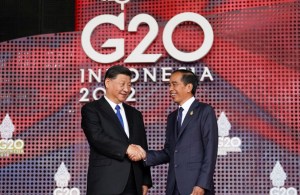Since 2011, observers have regarded Indonesia as a hot accession candidate should BRICS, a forum of emerging powers with Brazil, Russia, India, China and South Africa as members, decide to enlarge their club.
When during the latest BRICS summit held in South Africa in August 2023 China persuaded its hesitant partners to invite new members to the forum, Indonesia was on the cards of all five BRICS member governments.
The country’s potential value for BRICS is obvious. It is the country with the world’s fourth largest population, a fast-growing economy with the potential to become one of the globe’s top five economies by 2045 and a leading power in Southeast Asia, a strategically important region where the United States and China compete for influence.
But surprisingly, Indonesia was not among the six countries – Argentina, Saudi Arabia, Egypt, the United Arab Emirates, Iran and Ethiopia – that were selected from among 23 countries that had submitted letters of interest. Indonesian President Joko ‘Jokowi’ Widodo informed the public that the Indonesian government had decided not to hand in a letter of interest because it did not want to rush membership.
According to Jokowi, the government needs more time to study the benefits and drawbacks of BRICS membership, especially in the economic domain, and wants to consult with its ASEAN partners.
This is the official version, but peeling back the surface reveals the deeper motivations behind Indonesia’s decision not to join BRICS.
One reason is that Indonesia’s foreign policy has a long tradition of non-alignment. Aggressive Chinese attempts to enlarge BRICS cause wariness in Jakarta, invoking Cold War-era bloc building against the dominance of the United States and its Western allies.

Joining BRICS would be read in the West as signaling a shift towards the Chinese camp. It would be perceived as a major change in Indonesia’s hedging and issue-balancing policy, under which Jakarta tilts more toward the United States in security affairs and more towards China on economic issues. The credibility of the country’s age-honored bebas aktif or “free and active” doctrine would suffer.
Following the enlargement of BRICS, the forum is increasingly seen in the West as a geopolitical vehicle for China and Russia. This means that Indonesia must carefully calibrate its position. Indonesia’s failure to unequivocally condemn Russia’s invasion of Ukraine – a flagrant violation of international norms of sovereignty, territorial integrity and peaceful conflict resolution, to which Indonesia explicitly subscribes — has raised eyebrows in the West.
This also holds true for Indonesia’s negotiation of a free trade area with the Russian-led Eurasian Economic Union. Joining BRICS would have exacerbated Western irritations.
Any semblance of further tilting towards Russia and China jeopardizes relations with the West. As BRICS is a highly diverse forum, even more so after enlargement, membership would come with high transaction costs for Indonesia.
Indonesia would have to devote enormous diplomatic resources to BRICS in order to ensure its alignment with Indonesia’s national interests. BRICS accession would also compromise Indonesia’s much-cherished goal of being a “good global citizen.”
Indonesia’s identity in international relations markedly differs from the other members of BRICS. Although Indonesia shares BRICS members’ profound dissatisfaction with the existing international order, it airs demands for reform in much more conciliatory and accommodating language.
It is no accident that in 2013 Indonesia joined MIKTA, a forum consisting of Mexico, Indonesia, South Korea, Turkey and Australia, which seeks to act as a “constructive multilateralist,” “bridge-builder” and “force for good.”
While the performance of MIKTA as a bridge-builder and Indonesia as a mediator is debatable, Indonesia’s moderation enabled it to maintain open dialogue channels with the Global North while advocating for the interests of the Global South. Indonesia has been invited to speak as a guest at both the Western G7 and BRICS.
The Indonesian government also remains unconvinced of the economic benefits of BRICS accession. Even without BRICS membership, Indonesia is economically closely affiliated with China, its largest trading partner and a major investor.
Trade with China dwarfs trade with the other BRICS member states, including the new members. Maintaining close economic relations with Beijing does not require BRICS membership and can be promoted bilaterally.

Indonesian economists do not regard BRICS’s New Development Bank as a particularly attractive option to finance the country’s investment needs. With an initially subscribed capital of US$50 billion, it clearly trails other development banks such as the World Bank and the Asian Development Bank.
Key figures in the Indonesian cabinet, like Finance Minister and former World Bank managing director Sri Mulyani Indrawati and Foreign Minister Retno Marsudi, opposed joining BRICS and may have more confidence in Western-dominated financial institutions even while pleading for their reform.
BRICS accession would also endanger Indonesia’s endeavors to become the third Asian member of the OECD. While Indonesia’s development is still far behind the level at which South Korea was admitted and admission is a lengthy process, not acceding to BRICS could be used as leverage for Indonesia to expedite OECD membership.
Not joining BRICS reflects Indonesia’s foreign policy pragmatism, a key dimension of the bebas aktif doctrine originally formulated by founding father Mohammed Hatta. It is unlikely that Indonesia will abandon this proven strategy in a highly volatile international political environment.
Jurgen Ruland is Professor Emeritus in the Department of Political Science at the University of Freiburg, Germany.
This article was originally published by East Asia Forum and is republished under a Creative Commons license.

